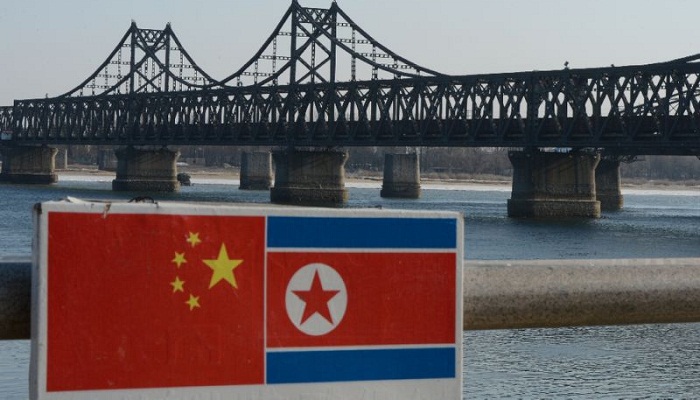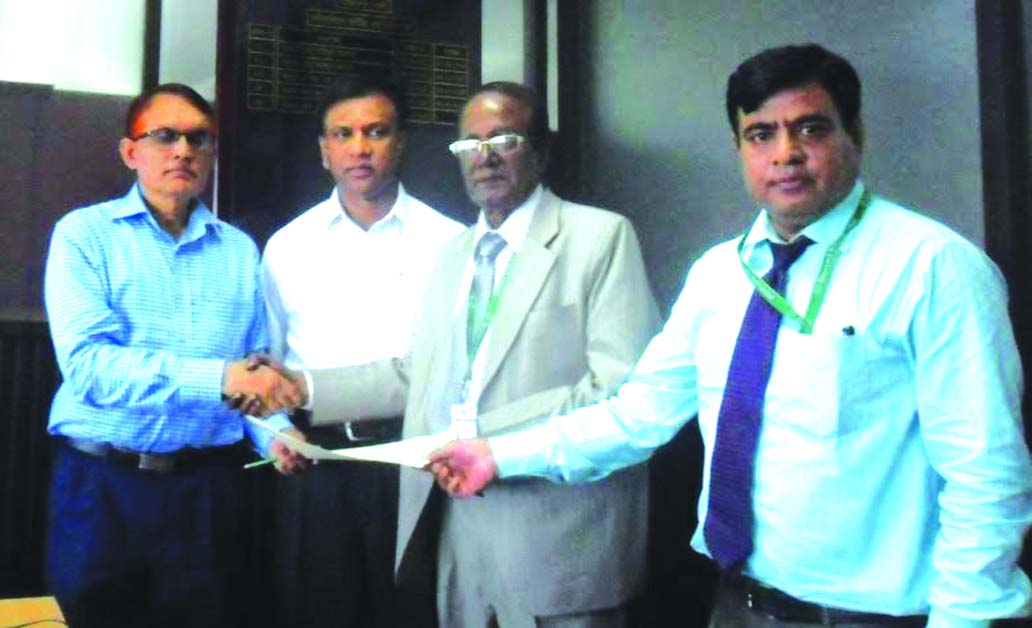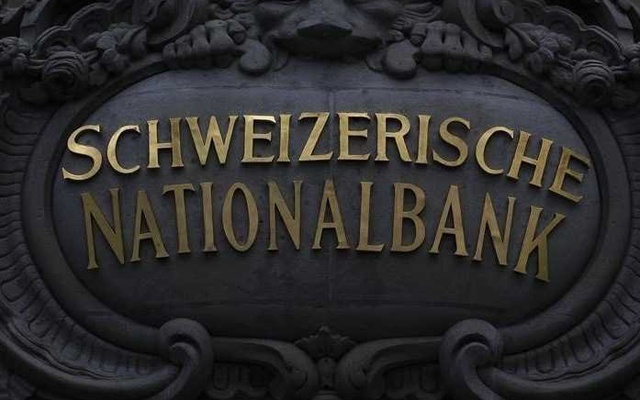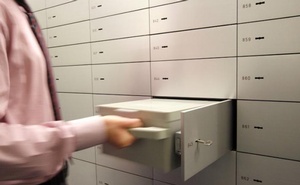Banking
US sanctions Chinese bank for laundering N.Korean cash

WASHINGTON: The United States slapped unprecedented sanctions Thursday on a Chinese bank accused of laundering North Korean cash after President Donald Trump said Beijing's efforts to put the brakes on Pyongyang's nuclear drive had failed.
As South Korea's new president visited Washington, the Treasury Department announced the Bank of Dandong would be severed from the US financial system for acting "as a conduit for illicit North Korean financial activity."
And while Treasury Secretary Steven Mnuchin said the move was not targeted at China's government, it is likely to infuriate Beijing, which says it has been unstinting in its efforts to ease tensions with North Korea.
The announcement came on the same day that it emerged the Trump adminisration had approved $1.3 billion in arms sales to Beijing's archrival Taiwan and as the State Department voiced concerns about basic freedoms in Hong Kong under Chinese rule.
Since early in his administration, Trump has pushed China to do more to rein in the North Korean regime and its leader Kim Jong-un.
However, he raised eyebrows last week when he thanked his Chinese counterpart Xi Jinping for Beijing's help but then concluded that Xi's efforts had "not worked out." Trump did not spell out what he intended to do next.
The Treasury announcement said Dandong had been identified as "a foreign bank of primary money-laundering concern" that had been "facilitating millions of dollars of transactions for companies involved in North Korea's WMD (weapons of mass destruction) and ballistic missile programs."
The bank will now be prevented from having accounts or doing business with US financial institutions.
The department also sanctioned two Chinese individuals said to have established front companies to facilitate financial transactions for North Korea, and a Chinese shipping company accused of helping smuggle banned luxury goods into the country.
"This is not directed at China, this is directed at a bank, as well as individuals and entities in China," Mnuchin told reporters.
But he warned that Treasury will "follow the money" and take action where needed to cut off illegal finance.
"If we find other activity, we will sanction other entities. Nobody's off limits."
China, which borders North Korea and is considered its only major ally, argues that negotiations are the best way to persuade Pyongyang to halt its nuclear and missile activities.
China's approach is echoed by South Korea's dovish new president Moon Jae- In, who arrived in Washington late Wednesday on his first foreign visit since taking office earlier this month.
Moon was due to dine with Trump on Thursday night, after meeting earlier with Congressional leaders as he pushes his policy of engagement with the North.
Speaking to reporters on his flight to the US, Moon said Seoul and Washington should offer concessions to Pyongyang if it complies with their demands, according to multiple South Korean reports.
"Without rewarding North Korea for its bad actions, South Korea and the United States should closely consult what they may give the North in return for a nuclear freeze," he said.
Speaking alongside Moon in Congress, House Speaker Paul Ryan told reporters that the US and South Korea "shared concerns" about North Korea.
Moon responded by saying that when it comes to humanitarian issues, "we must cross boundaries and all party lines, and all try to unite together as one."
Trump has been pushing for tougher sanctions against Pyongyang to curb its nuclear ambitions.
His administration has said military action was a possibility.
But US officials have played down the idea that Washington and Seoul are at odds over their approach, with one senior administration official insisting Thursday that they "share precisely the same goal, which is the complete dismantlement of North Korea's nuclear and missile programs."
Trump was heaping economic and diplomatic pressure on Pyongyang "in order to change their calculus," the official said. - 'No evidence' of reduced threat -
"Right now we see no evidence that they are seeking to reduce the threat from nuclear weapons or ballistic missile technology."
When Trump and Moon hold formal talks on Friday, they are likely to discuss a controversial US missile defense system that has been set up in South Korea to guard against missile threats from the North.
Though parts of the Terminal High-Altitude Area Defense (THAAD) system are already in place, Moon suspended further deployment following a furious campaign of economic sanctions and diplomatic protests by Beijing. Some analysts believe the Chinese see the system as part of a long-range US effort to contain China.
news::daily sun/1-jul-2017Hossain Patwary, Director (Finance), Bangladesh Rural Electrification Board and A.F. Jamal Uddin, Head of Agent Banking Division of Standard Bank Ltd, exchanging the signing documents on electric bill collection through the bank at the board head office r
 Hossain Patwary, Director (Finance), Bangladesh Rural Electrification Board and A.F. Jamal Uddin, Head of Agent Banking Division of Standard Bank Ltd, exchanging the signing documents on electric bill collection through the bank at the board head office r
Hossain Patwary, Director (Finance), Bangladesh Rural Electrification Board and A.F. Jamal Uddin, Head of Agent Banking Division of Standard Bank Ltd, exchanging the signing documents on electric bill collection through the bank at the board head office r
ADB-funded projects face hurdles
As many as 23 Asian Development Bank (ADB)-funded ongoing projects in the country are facing hurdles mainly due to bureaucratic tangles resulting long delay in their implementation.
Delay in procurement, failure to disburse and spend money in time, lack of environmental monitoring reports, delay in handing over of sites to contractors and in consultant selection are the main issues that caused the hurdles.
The ADB and the Economic Relations Division (ERD) have jointly identified the 23 projects recently with a view to finding out ways to overcome the shortcomings.
Of the projects, seven are of energy sector, three on urban development, four on transport sector, five on public and finance, three on agriculture and natural resources, and one on education.
According to officials at the Ministry of Finance, until April of the just concluded fiscal year contracts of projects worth US$444 million were awarded to the executing agencies against the target of $1.021 billion.
During the period, the volume of fund disbursement was $618 million against the target of $771 million.
Presently, some 51 ADB-funded projects are ongoing in Bangladesh.
The project performance is evaluated on five criteria -- contract awards, disbursement, technical soundness, safeguards compliance, and financial management.
The ADB allocates Ordinary Capital Resources (OCR) and the Asian Development Fund (ADF) resources on the basis of project performances.
Documents show that the Gas Transmission and Development Project is facing three problems. These are non-availability of gas in Khulna city gate station, $9.0 million remaining un-contracted and $20.15 million un-disbursed despite expiry of grace period and lack of environment monitoring report.
The Natural Gas Access Improvement Project is yet to make any headway in the southwestern region despite completion of procurement, $40.41 million remaining un-contracted and $54.59 million un-disbursed even six years after the loan approval.
In the Power System Efficiency Improvement Project, $109.3 million remained un-contracted and $153.33 million un-disbursed almost seven years after the loan approval.
The change order for piling remained pending for two years and the development project proposal for solar PV is yet to be approved.
The procurement for the Dhaka Environmentally Sustainable Water Supply Project was delayed while $174 million fund remained un-contracted and $208 million un-disbursed for three and a half years after the project approval.
The land acquisition and resettlement for the SASEC Rail Connectivity Project are yet to be completed alongside delay in reviewing the design.
The project's $145 million remained un-contracted and $434 million un-disbursed for two and a half years after the loan approval.
The establishment of an environmental safeguards unit in the Bangladesh Railway is yet to be completed, documents show.
Officials said even after one and a half years of loan approval, the government could not award contract for the Railway Rolling Stock Project.
Documents also show that work on the Second Small and Medium-Sized Enterprise Development Project is yet to start even after one and a half years of its approval and the loan effectiveness is now delayed.
It was found that even some grant-funded projects also could not make any headway.
The submission of well-defined capacity development plan of 'Pilot Project on Weather Index Based Crop Insurance' remained pending for long. Some $127,000 of the project remained un-contracted and $784,000 un-disbursed even four years after grant approval.
When contacted, a senior official of the Ministry of Finance said it is very hard to avoid bureaucratic complicacies; efforts are there to find ways to improve capacity for quick implementation of the project.
"We will review performance of the projects soon and take steps to remove the shortcomings," he said.
AIIB eyes inaugural US dollar bond
HONG KONG: The China-led Asian Infrastructure Investment Bank said on Thursday it may issue its first bond in US dollars as early as this year.
Soren Elbech, treasurer at the Beijing-based multilateral development bank, told IFR that it will be a benchmark bond but did not specify a maturity, reports The Business Times.
Moody's assigned the AIIB a first-time Aaa long-term foreign currency rating on Thursday with a stable outlook, citing expectations that AIIB's liquidity position will be as strong as other highly rated multilateral development banks.
Mr Elbech said the deal could come this year, but it would take some months before the AIIB was ready to debut the transaction, with time required for bond and swaps documentation, and AIIB's new head of funding joining the institution only in September.
"At some stage later in the year, the market also becomes less interesting to engage with. It's likely, but it's equally likely it could be 2018," he said.
The AIIB is likely to issue bonds of a few billion dollars annually in the next few years, as it ramps up borrowing.
"We are going to be very, very similar in our capital markets approach to the other multilaterals," Mr Elbech said.
However Mr Elbech forecasts the paid-in capital to have largely been dispersed approximately five years from now, warranting the need to discover different sources of funding.
"And to not shock the market when we need to start borrowing, I want to start interacting with the market, build a yield curve, look at pricing references and get global investors used to the AIIB name, meet with them and have an opportunity to get them to ask all the questions they need to open their credit lines, put us in the right portfolios, position us alongside their peer group and gradually ramp up the borrowing programme until we have a borrowing need," Mr Elbech said.
Bangladeshis' deposits in Swiss banks rise 20% in 2016
 A Swiss National Bank logo is pictured on the SNB building in Bern. Reuters
A Swiss National Bank logo is pictured on the SNB building in Bern. Reuters
Deposits by Bangladeshis in Switzerland's banks rose by about 20 percent year-on-year in 2016.
The amount rose to 661.96 million Swiss francs or Tk 55.86 billion in 2016 from 550.85 million francs in the previous year, according to data released by Swiss National Bank or SNB on Thursday.
Zurich-based SNB published the data in its annual report titled 'Banks in Switzerland 2016'.
Money parked by Bangladeshis in the Swiss banks totalled around 506.05m francs in 2014.
The total funds held by all foreign clients of Swiss banks also rose to 1.42 trillion francs in 2016 from 1.41 trillion francs a year ago.
The Alpine country is preparing to dismantle bank secrecy next year when it begins sending information about its customers' accounts to foreign tax agencies.

FILE PHOTO - An employee checks a safe box at the vault of Swiss UBS bank in Zurich-Zollikon, Switzerland January 21, 2009. REUTERS/Arnd Wiegmann/File Photo
But Switzerland's multi-trillion-dollar financial industry is seeking new safeguards to protect bank data against misuse that could expose clients to crimes such as kidnapping or blackmail.
Money parked by Indians in Switzerland’s banks nearly halved to 676 million Swiss francs in 2016 to hit a record low amid a continuing clampdown on the suspected black money stashed behind their famed secrecy walls.
Swiss banking secrecy in its current form took shape before World War II, and provided the victims of Nazi persecution with a way to protect their assets.
The movement to scrap the policy in Switzerland and other well-known "tax havens" arose after the financial crisis of 2008 and subsequent eurozone debt crisis.
news:bd news 24/30-jun-2017


